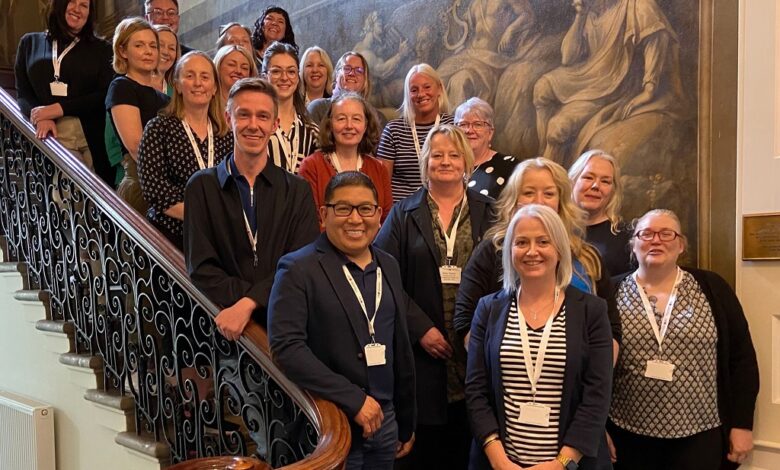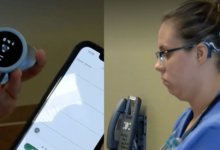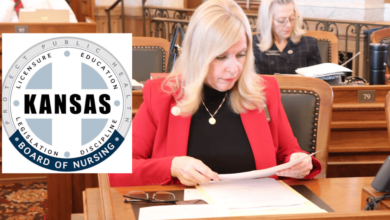Practical support for digital change leadership in wound care nursing

A new development programme is supporting the growth of digital change leadership in wound care nursing.
The first cohort graduated last month from the Digital Woundcare Leadership Programme, receiving their awards at the Royal College of Nursing from general secretary and chief executive Nicola Ranger.
“The aim was to develop a cycle-breaking learning programme for aspiring nurse leaders”
Jimmy Endicott
Support for transformation in this field is much needed. Chronic wound care costs the NHS £8.3bn every year, the highest spend after cancer and diabetes care.
Landmark research by the health economist Julian Guest described a national “burden of wounds”, driven by unwarranted variation in care underpinned by inconsistent data about wound caseloads.
The National Woundcare Strategy Programme makes recommendations for addressing the issue with digital change.
My 15 years working with nurses on digital innovation have seen some fantastic nurse-led projects and great examples of supportive organisations, but too many initial conversations never get out of the starting blocks, despite frontline enthusiasm.
I’ve seen nurses working lunchbreaks and evenings to initiate projects, without protected time, often struggling to navigate the processes and hierarchy of their own organisations.
They juggle the pressures of growing caseloads and understaffing, while grappling to connect with organisational stakeholders that could support them, sometimes battling and failing to align with strategic organisational narratives that could give their ideas wings.
They express frustration about hearing “no funding” or just plain “no”, circling around until momentum fizzles-out and, in some cases, having the plug pulled after months of work.
The aim was to develop a cycle-breaking learning programme for aspiring nurse leaders focused on the pragmatics of initiating digital change in wound management.
“Nurses are natural innovators, well-positioned to drive digital transformation”
Jimmy Endicott
The step-by-step course was to be delivered over a five-month sustained development period with four days protected learning time, in which they could build the practical skills and tools needed to initiate a project idea with better success.
Central to the idea was that participants would bring a real-world digital development project idea with them, to form the basis of their practical work during their time on the course.
To gain feedback on the Digital Woundcare Leadership Programme, we interviewed all of the first cohort of 21 participants, both before and after they completed the course.
“I heard about the programme through our digital lead,” said delegate Craig Ware, nurse and transformation facilitator at North East London NHS Foundation Trust.
“It fitted what I need precisely because we’re trying to get a wound management digital platform funded and implemented. We want to put in place an app to measure wound healing and progression.”
The specific scope of the course meant participants brought similar ideas. Claire Hoggard, tissue viability specialist nurse at Mid Yorkshire Teaching NHS Trust wanted to address issues in community nursing with taking images and assessing wounds.
“I’d like an easy way to make that more accessible for staff so they’re not wasting time, we can get better patient outcomes and we can see progress in the patient’s journey,” she said.
The idea was for participants to form strong bonds and work communally on their project as a peer support network to help achieve better outcomes.
“I’m really excited about meeting other people that are like minded,” said delegate Anna Swinburn, advanced lymphoedema nurse specialist at Accelerate CIC, at the start of the course.
“Already, within the first 15 minutes, we’ve had some amazing conversations and it’s so lovely to get that network so when you’re looking for ideas or support from people in making changes, you’ve got that network to go to.”
The programme was created in partnership between industry and change experts like Future Nurse, the organisation re-imagining nursing for the digital age, and digital care, a small team with deep expertise in digital health, passionate about helping more people to benefit from it.
Critical input came from visionary health-tech providers Healthy.io, suppliers of the digital wound care management platform Minuteful for Wound, which funded, initiated and led project delivery.
“Leadership training gives them the confidence and skills to navigate organisational barriers and lead innovation”
Jimmy Endicott
Applications to attend were invited solely from wound care practitioners in community health settings, where the vast majority of the “burden of wounds” is managed.
The first cohort of participants, including lead staff from tissue viability, community nursing, practice nursing, lymphoedema and podiatry, started the programme in May.
“The process for application was very smooth,” said Claire Hoggard. “Everyone was really friendly, it was a great interview experience, and I was really looking forward to networking with other colleagues on the course.”
Nurses are natural innovators, well-positioned to drive digital transformation. They make up over 50% of the NHS workforce and deliver 90% of direct patient care.
A 2023 McKinsey report found that 15% of nursing time could be saved through automation and better task delegation, yet nurses are often excluded from the design of technologies that could enhance their work and improve patient outcomes.
Matthew Wynne, senior lecturer in nursing at Liverpool John Moores University, highlights how nurses should be more involved ideas ideation because they are closest to the realities of frontline care.
“This is especially true in wound care, which is primarily nurse-led in the UK, making nurses ideal leaders in driving technological change.
Leadership training gives them the confidence and skills to navigate organisational barriers and lead innovation.
“If nurses don’t step-up, others less connected to patient care will take the lead, risking less-effective solutions.”
The new course fundamentally aimed to empower nurses to be more involved in the formative stages of project ideation.
“We’ve always left it to the higher grades to do and I think we need to be more heavily involved in that process,” said delegate Michaela Delahunty, clinical lead for tissue viability and lymphoedema at Rotherham, Doncaster and South Humber NHS Foundation Trust.
“I feel confident in my ability to influence change from a clinical point of view but where I don’t feel I’ve got the skills is more on the management side of making a business plan.”
Other participants echoed this. Developing a case for change was the most common goal cited when they were asked what they hoped to achieve from the course.
“Our issue will be the financial impact,” said one delegate about her proposed project. “But if we can prove it will be of benefit to staff and patients, hopefully we will be successful.”
Consequently, the programme majored on business case writing. Leading healthcare strategist Lesley Soden helped participants understand how to articulate the financial return of clinically-led change.
There was also a focus on understanding the key organisational stakeholders to work with on project initiation with expert guidance on how to better “sell” their ideas from innovation scaler and commercial expert Calum Macleod.
Lived experience was shared by nurse innovators Pip Hodgson, who worked on the NHS app, NHS covid pass and NHS.uk website, and Jenni MacDonald, founder and executive nurse director of the NHS Pioneer Wound Healing and Lymphoedema Centres.
While former chair of the Legs Matter campaign and National Woundcare Strategy Programme Lower Limb Pathway, Dr Leanne Atkin, delivered the compelling opening session.
Not all content was clinically oriented, practical tips on preparing presentations and navigating information governance processes were also in the mix.
But participants were most surprised by the “invaluable impact” on their leadership skills of a creative writing workshop with brand marketing expert Chris Davenport and presentation skills masterclass from the Royal Academy of Dramatic Arts (RADA).
“I wouldn’t have expected to have developed such increased confidence using these methods, but it has been transformational,” said one graduate.
Developed in partnership with frontline staff and expert clinicians, change experts, NHS managers, health technology leads and subject matter specialists, the learning content hit the mark.
100% respondents were fairly to very satisfied that the course had helped them develop the skills required to be a leader of digital change in nursing, 94% were very satisfied.
“Time will tell whether the course succeeded in setting-off ripples that lead to long-term sustainable digital change in wound care”
Jimmy Endicott
94% respondents had a good to fair understanding of the process required to bring about change in their organisation, reporting “feeling empowered to influence digital change and ready to go and do it.”
At the outset of the course, only 5% candidates said they had a good understanding about the process in their organisation for implementing change.
100% respondents were very satisfied that the course and its content met their expectations and would recommend the course to a colleague in a similar role.
“If the NHS is to truly digitise, it needs to bring its largest staff group with it,” says Professor Natasha Phillips, founder of Future Nurse and former chief nursing information officer of NHS England, who delivered the course’s closing session.
“In my previous role, we saw nurse involvement in system implementations, like electronic patient records, rise to over 85%. Whist this is promising, it only addresses technology that already exists. Nurses face challenges in developing new innovations, as they report a reliance on personal resilience to push their ideas forward.
“We’ve come forward in terms of having more nurses involved, more leadership, and there’s more guidance available – but we need a stronger nursing voice in all stages from innovation through to implementation.”
The sentiment was echoed by one participant who said at the course outset that she was “looking forward to being able to have my voice heard, to be listened to and to give my clinical expertise and opinions on things we’ve tried in the past.”
Investing in nurses’ innovation skills, enhances their influence in a rapidly evolving sector, opening-up new career paths, improving job satisfaction, and promoting gender equity in traditionally male-dominated industries.
Additionally, their involvement ensures that healthcare technologies are more patient-centred, improving outcomes for diverse populations.
Empowering nurses in health tech development not only drives better healthcare innovation but also strengthens societal equity, supporting broader economic and social progress.
“At Future Nurse, our goal is to create a social movement of nurses, midwives, and healthcare tech allies to foster cross-disciplinary learning,” says Professor Phillips.
“This will enable nurses to lead future healthcare innovations. The focus of this course on wound care, a high-cost, cross-sector issue largely managed by nurses, has been a key factor in the programme’s success.
“The aim of Future Nurse is to continue building a service that supports nurses in creating meaningful healthcare advancements. This new course proves that working in partnership with industry and experts across the health tech sector yields real benefits.”
Time will tell whether the course succeeded in setting-off ripples that lead to long-term sustainable digital change in wound care across multiple NHS organisations.
But the participants already have their view, more than four out of every five graduates feel it is fairly-to-very likely that their proposed digital change project will now be delivered.
Jimmy Endicott, digital health innovation leader and director of the Digital Woundcare Leadership Programme







